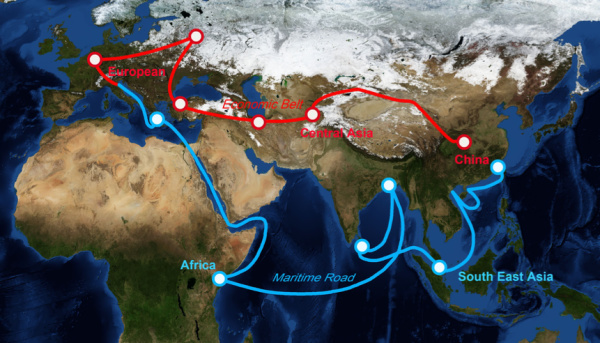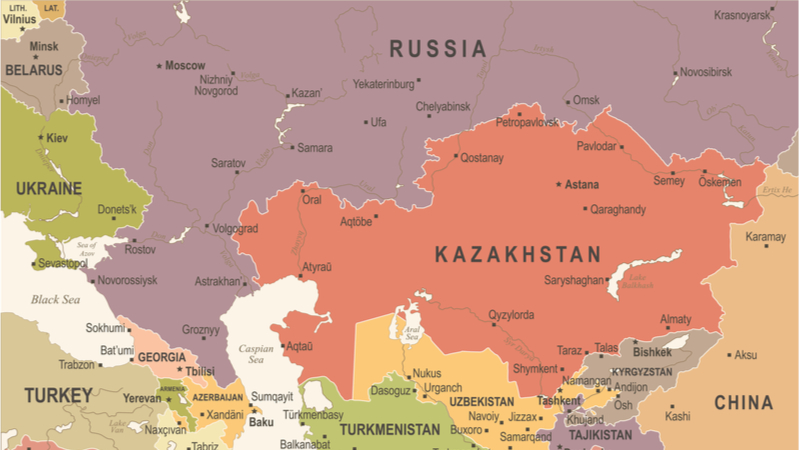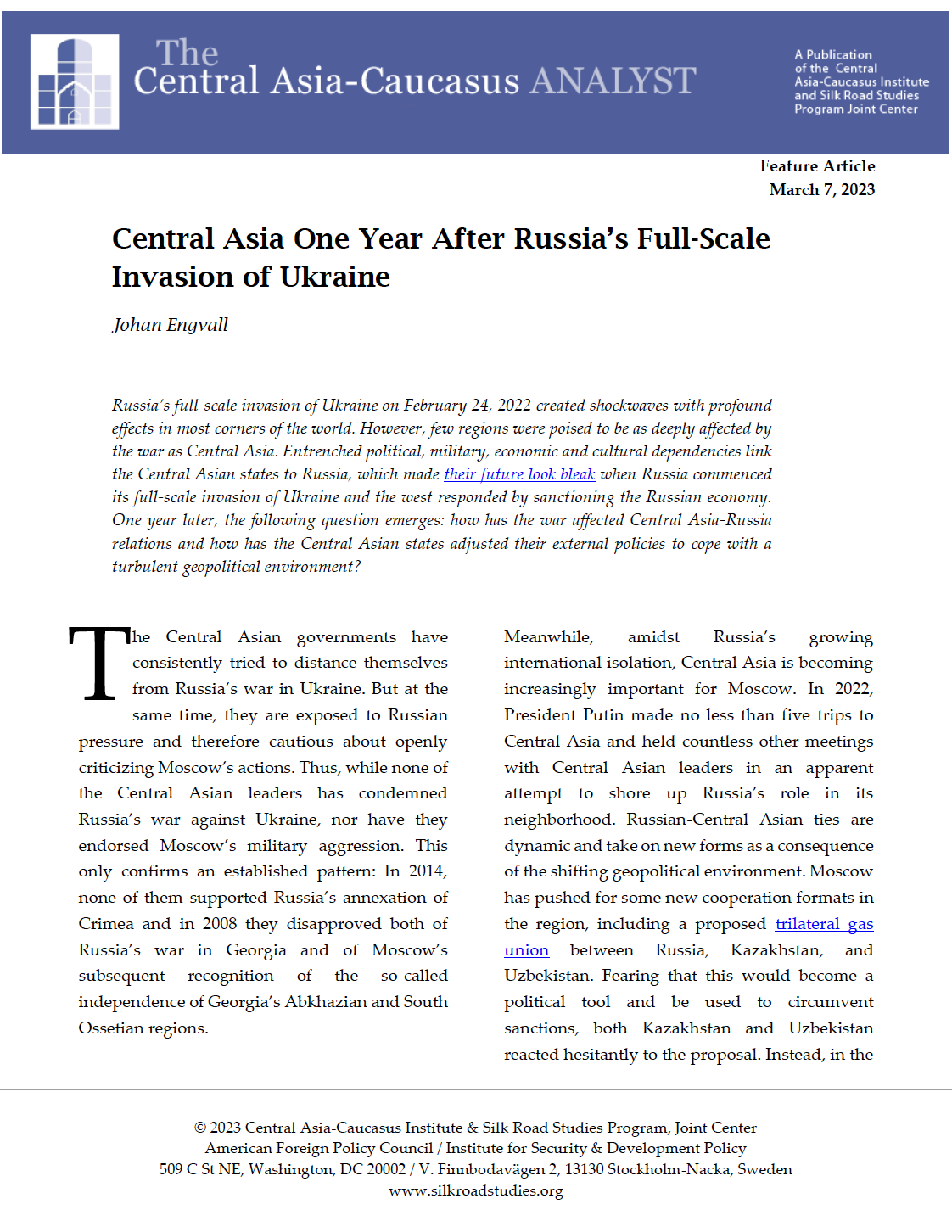Central Asia One Year After Russia’s Full-Scale Invasion of Ukraine
By Johan Engvall
March 7, 2022
Russia’s full-scale invasion of Ukraine on February 24, 2022 created shockwaves with profound effects in most corners of the world. However, few regions were poised to be as deeply affected by the war as Central Asia. Entrenched political, military, economic and cultural dependencies link the Central Asian states to Russia, which made their future look bleak when Russia commenced its full-scale invasion of Ukraine and the west responded by sanctioning the Russian economy. One year later, the following question emerges: how has the war affected Central Asia-Russia relations and how has the Central Asian states adjusted their external policies to cope with a turbulent geopolitical environment?
The Middle Corridor and the Russia-Ukraine War: the Rise of New Regional Collaboration in Eurasia?
By Selçuk Çolakoğlu
January 31, 2023
After Russia’s invasion of Ukraine, the West‑led sanctions regime against Russia, coupled with Russian counter-sanctions, has affected everything from energy resources and logistics to banking transactions and customs procedures. Western countries have realized that Moscow can weaponize its geopolitical position and logistic networks. Strategic over‑dependence on Russia’s energy, markets, and logistics has created significant challenges to neighboring countries due to increasing political tensions between the West and Russia. This development is undermining the Northern (Russian) Corridor’s position as the main overland East-West corridor. In turn, the alternative Middle Corridor is currently facing its best opportunity ever to take a leading position in connecting Europe and Asia.

Russia's War in Ukraine: Implications for Central Asia
By Johan Engvall
March 14, 2022
Russia’s invasion of Ukraine and the West’s economic response to it has put Central Asia in a precarious position. As part of what Moscow perceives as its sphere of interest, the repercussions of Putin’s war are bound to affect the Central Asian countries particularly hard. While anything but static, the nature of the Russia-Central Asia relationship still enables Moscow to retain a strong influence in the region. Russia remains the dominant security actor in Central Asia, even more so following the U.S. withdrawal from Afghanistan. Their economies remain closely interlinked with Russia, and at the political level, a distinct type of post-Soviet authoritarian leadership model with roots in the Soviet system facilitates political dialogue. Western disengagement from the region has left them more vulnerable, but the unpredictable consequences of Russia’s military adventurism might force them to realign their external relations.

The impact of Russia's Turkey sanctions on the North Caucasus
By Emil Aslan Souleimanov
February 3rd, 2016, The CACI Analyst
The abrupt deterioration of relations between Russia and Turkey, caused by the downing of a Russian warplane by a Turkish F-16 on the Turkish-Syrian border in late November, has had serious implications for the North Caucasian communities in both Russia and Turkey. While Russia’s imposition of extensive sanctions on Turkey has met displeasure among some of Russia’s Turkic-speaking populations, it has also led to a polarization among Russia’s North Caucasians, some of whom have favored Turkey, an emerging Sunni power, over the state in which they hold citizenship.
Tajikistan's government misses the real problem of labor migrants
By Oleg Salimov (08/07/2015 issue of the CACI Analyst)
Tajik labor migrants are again at the center of political games between Russia and Tajikistan. At the end of June, Tajikistan’s Ministry of Foreign Affairs delivered a note of protest to Russia’s Ambassador in Tajikistan, objecting to an article in the Russian newspaper AiF, which describes Tajikistan as a country of labor migrants. Soon thereafter, the Russian government allowed the reentry to over 1,000 Tajik migrants earlier deported from Russia for violating immigration laws. This step, as well as the removal of the article from its original source, tempered the Tajik government’s reaction. However, the problem of Tajik labor migrants is far from resolved.
The original article published in the popular Russian newspaper was titled “The country of guest workers. AiF’s special report from Tajikistan.” The article’s central theme was the urgent need for a visa regime between Russia and Tajikistan. Tajikistan’s government as well as the Russia-based social movement Tajik Labor Migrants found the article highly derogatory and offensive. The official statement of Tajikistan’s Ministry of Foreign Affairs pointed to the destructive consequences of such publications on the Tajikistan-Russia relationship. The ministry appealed to the Russian government to prevent publications that distort the truth and contribute to a negative image of Tajikistan.
At the same time, Karomat Sharipov, the chairman Tajik Labor Migrants, published the group’s response to the article on its website. Sharipov asserted that the article was part of a dirty political campaign by Russian pseudo-patriots, aiming to discredit Tajikistan and denigrating the Tajik people. Sharipov agreed that the visa regime for labor migrants is needed, but mainly in order to protect Tajiks arriving in Russia as opposed to protecting Russia from Tajiks as argued in the article. He also noted that such publications are unacceptable for countries seeking to build a strategic partnership.
Following the public outrage in Tajikistan, the Russian government on July 2 pardoned over 1,000 Tajiks, who had previously been deported from Russia for violating the rules of their legal stay. According to Abdullo Kodiri, the press-secretary of Tajik Migration Services, the agreement was reached after negotiations between the two countries’ migratory services. Russia hosts close to a million Tajik migrants as of June 2015, according to Russian Federal Migratory Services. The number is about 200,000 lower than in December 2014.
The amount of money transferred from Russia to Tajikistan by labor migrants in the first quarter of 2015 is also down by 42.4 percent compared to the first quarter of the last year, according to Tajikistan’s National Bank (TNB). TNB reported a total of US$ 289 million transferred to Tajikistan from Russia in the first quarter of 2015. Russia’s Central Bank instead reported transfers of US$ 364 million from Russia to Tajikistan and a drop of 87 percent in the first quarter of 2015, as compared to the same period in 2014. The coefficient of money transfers from Russia to Tajikistan’s GDP is down from 30.8 percent in the first quarter of 2014 to 19 percent in the first quarter of 2015, according to TNB.
The lower number of Tajik labor migrants and the significant drop in money transfers to Tajikistan can be explained by the slowing Russian economy as a result of falling oil prices and economic sanctions implemented by the U.S., EU, and some other countries. While Tajikistan is not part of West-Russia confrontation, the country feels the effect of these sanctions firsthand. Tajikistan could have avoided this situation if the Tajik government would have been genuinely concerned about the problem of outmigration from Tajikistan, unemployment, and the dependency of its economy on money transfers from labor migrants.
While provocative, the AiF article describes a problem that the Tajik government continues to neglect. While expressing its outrage over the article, the Tajik government has failed to outline any actions to address the problem of labor migrants, whose input into Tajikistan’s economy reached 42 percent of the country’s GDP at its peak in 2013. Instead of negotiating with Russia on pardoning labor migrants, Tajikistan’s government should focus on fighting unemployment at home and building a self-sustaining economy. This will create a far more positive image of Tajikistan, which was the primary concern of the government’s protest.
Tajik Labor Migrants warns about the growing number of Tajik migrants disillusioned with their own government and the prospects of employment back home, which become radicalized and join extremist groups like ISIS. In the beginning of July 2015, Radio Ozodi/Freedom reported that Tajikistan’s embassy in Moscow had received a letter from Russian ultranationalists requesting the immediate return of all Tajik migrants to Tajikistan to avoid “dire consequences.” Tajik labor migrants are frequently treated as a point of leverage in political negotiations between Russia and Tajikistan, but are simultaneously a highly vulnerable group whose real needs are rarely recognized.





